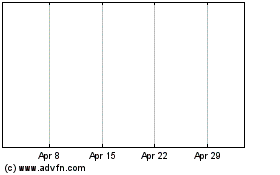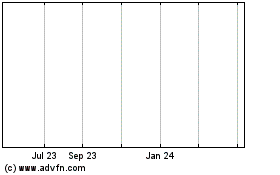UK Supreme Court Rules Parent Companies Can be Liable for Subsidiaries' Failings
April 10 2019 - 8:27AM
Dow Jones News
--Zambian villagers' case against Vedanta must be heard in
English court
--The unanimous ruling made by five U.K. Supreme Court judges
could have wider implications
--Supreme Court judges say parent companies are responsible for
actions of their subsidiaries
By Oliver Griffin
The U.K. Supreme Court has ruled that a case by Zambian
villagers against Vedanta Resources and its subsidiary Konkola
Copper Mines must be heard in English courts in a landmark ruling
that could have wider implications for other companies.
Supreme Court judges agreed unanimously that almost 2,000
villagers in Zambia, who allege the loss of livelihoods and damage
to their health caused by toxic discharges from Konkola's Nchanga
mine entering their water supplies, must have their case heard in
the High Court.
As part of the ruling, the judges disagreed with an earlier
analysis by the Court of Appeal that said a parent company couldn't
incur liability in respect of the activities of a subsidiary.
Leigh Day, the law firm representing the villagers, said the
court heard that Vedanta had published material claiming control
and responsibility over KCM. The court also heard that in its
material, Vedanta assumed responsibility for appropriate groupwide
environmental control and sustainability standards, and set out
guidelines for training, monitoring and enforcement of the
standards, Leigh Day said.
The Supreme Court subsequently ruled that Vedanta must be held
accountable for these publicly made statements and that it
therefore has a duty of care towards the villagers.
Daniel Leader, a partner at Leigh Day, said: "I suspect in
boardrooms around the country there will be consternation at this
judgment."
Speaking to Dow Jones Newswires, Mr. Leader said the ruling
showed that contrary to the Court of Appeal's previous findings,
global policies can be enough for cases to be heard in countries
where parent companies are based.
"If the parent company is holding itself out as being
responsible for the supervision of the subsidiary its very omission
to do anything can constitute an abdication of responsibility," Mr.
Leader said.
The law firm said the ruling handed down by the Supreme Court
could have wider implications for companies that make public
commitments relating to their responsibilities to communities and
the environment and then fail to put these into practice.
Alongside Vedanta's responsibility for the mine, the villagers
argued that they wouldn't be able to achieve justice in Zambian
courts. They cited a lack of available funding and qualified and
experienced legal representatives, arguments with which the Supreme
Court agreed.
Now that jurisdiction has been asserted, the claims will be
heard in the High Court at a date to be determined, Leigh Day
said.
Leigh Day also represents two communities from Nigeria in claims
against Royal Dutch Shell PLC (RDSB.LN) and its Nigerian
subsidiary. Both communities allege they have suffered systematic,
continued oil pollution for years because of Shell's
operations.
While the Court of Appeal ruled in February last year in a split
vote that English courts didn't have jurisdiction over the claims,
Leigh Day said it now has more confidence that permission will be
granted for an appeal to be heard at the Supreme Court.
No representatives of Vedanta were immediately available for
comment.
Write to Oliver Griffin at oliver.griffin@dowjones.com;
@OliGGriffin
(END) Dow Jones Newswires
April 10, 2019 08:12 ET (12:12 GMT)
Copyright (c) 2019 Dow Jones & Company, Inc.
Shell 'A' (NYSE:RDSA)
Historical Stock Chart
From Mar 2024 to Apr 2024

Shell 'A' (NYSE:RDSA)
Historical Stock Chart
From Apr 2023 to Apr 2024
